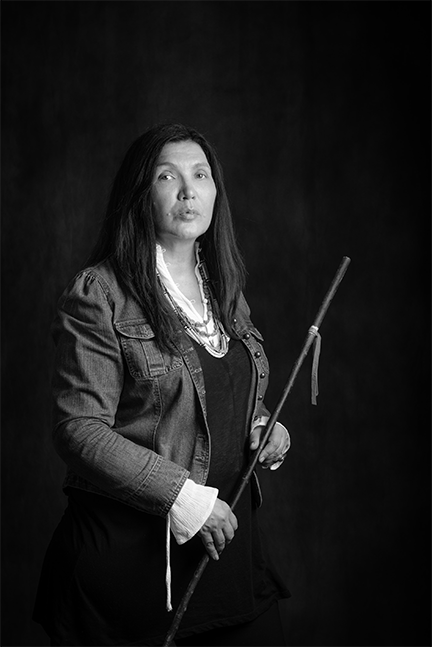Image Caption
Summary
Local Journalism Initiative Reporter
Windspeaker.com

Signals, an interactive exhibit showcasing creative technologies, is returning to the Vancouver International Film Festival (VIFF).
Signals will run for one week, beginning Oct. 1. A special feature of Signals is the Na wa shéw̓ay̓ta sp'en̓ém (the seed is growing) section, which includes about 20 short films produced in the world’s first-ever Indigenous video production training program from IM4 Lab Indigenous Virtual Production Films.
In collaboration with Emily Carr University of Art and Design, IM4 (Indigenous Matriarchs 4) Lab offers immersive workshops for Indigenous people who want to learn about virtual production tools.
“Virtual production is what we see in a lot of superhero and Star Wars type films being made now,” said IM4 creative director Loretta Todd (Cree/Métis). “The Mandalorian TV series is another example. They're made with virtual production with LED screens in huge LED screened warehouses in Toronto.
“It's changing how filmmaking is going to be made,” said Todd, “But it's usually just the domain of the very, very big studios with huge budgets.”
Todd said this translates to demand. These industries are in need of many more people. “Fourteen new technical job types have been created,” she explained.
This growing need is where IM4 saw potential. Todd created IM4 with Doreen Manuel, Tʼuyʼtʼtanat-Cease Wyss and Tracey Bonneau, combining decades of experience in filmmaking, media production, educating and storytelling. The media matriarchs provide guidance and training. They see their commitment to community as capacity building.
“So on one hand, we like to promote our peoples with opportunities to advance themselves professionally so that they can make a good living and have more opportunities,” said Todd. “But we also always want to give artists a place to express themselves and with these new tools so that they can make them their own and they can Indigenize them.”
The women of IM4 hope to see Indigenous people bringing these technologies into a wide array of applications, including arts and culture, education and language.
Of the short films contributed to the Signals exhibit, Todd said the storytellers that came to the workshop were a wide range of ages and had a variety of skill sets.
“There were people who never worked in tech and there were people who had worked in tech and gaming.”
IM4’s workshops train in specific programs, such as Unreal Engine, a program used by video game developers for years.
“Now it’s being used in virtual production environments,” said Todd.
Along with teaching these tools in workshops, IM4 is dedicated to providing opportunities to use the skills learned.
“It's always been my belief that we offer our training free and that it be inclusive,” Todd said. “And you don't have to have an art portfolio or made a film before.”
When Todd went to film school, she says she was always told no.
“I was always told ‘you need more training, or you're not ready for this’. There was always a barrier.”
So when she started producing children’s programming, her goal was “no barriers. I hired people who had never directed before, but I knew they would be good with kids,” because she’d seen their parenting. “I knew that they would be respectful with our kids and our Elders.” She would also hire people that had the experience, “but just weren't given the kind of opportunities that they deserved,” she said.
“If you're driven, and you really feel this is something that's important to you, then IM4 will try to provide the opportunity.”
Todd’s work also comes from the value of “always supporting our children and our youth.”
Her work in children’s programming is about creating positive images for young people. For example, in Coyote Science, now in its third season on Aboriginal Peoples Television Network (APTN).
“I knew that on television our kids don't see themselves.”
Culture is inseparable from identity and art making, said Todd. She gives the example of how IM4 was set up, “on a basis of reciprocity and redistribution of wealth and respect.”
One of the reasons Todd created the IM4 Lab was to “put into practice our belief systems and how we do business. So, it's not just in our own families, ourselves, our homes, but also communities,” she said.
“We can influence how the industry does business, bringing our own values into it, or at least showing that there's another way of doing things.”
Tickets for Signals are $15 and must be booked in advance, as admission will be on a timed, one-hour and 45-minute basis to explore the gallery space housing 14 stations and 35 projects.
More information and ticketing details can be found at https://signals.digibc.org/.
Local Journalism Initiative Reporters are supported by a financial contribution made by the Government of Canada.

